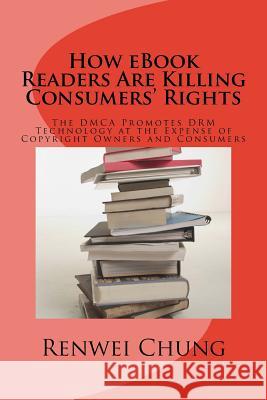How eBook Readers Are Killing Consumers' Rights: The DMCA Promotes DRM Technology at the Expense of Copyright Owners and Consumers » książka
How eBook Readers Are Killing Consumers' Rights: The DMCA Promotes DRM Technology at the Expense of Copyright Owners and Consumers
ISBN-13: 9781507697559 / Angielski / Miękka / 2015 / 40 str.
How eBook Readers Are Killing Consumers' Rights: The DMCA Promotes DRM Technology at the Expense of Copyright Owners and Consumers
ISBN-13: 9781507697559 / Angielski / Miękka / 2015 / 40 str.
(netto: 20,51 VAT: 5%)
Najniższa cena z 30 dni: 21,18
ok. 16-18 dni roboczych.
Darmowa dostawa od 40 zł!
The purchase of an eBook on restrictive eBook reader platforms only grants the customer a revocable license to view it. To ensure that the customer cannot violate her eBook license, content owners implement Digital Rights Management (DRM) technology to control and protect their works. The Digital Millennium Copyright Act of 1998 (DMCA) criminalizes any act that circumvents DRM technology. Platforms owners, like Apple and Amazon, are currently using licensing agreements, DRM technology, and patents to control copyrighted content. Through licensing, platforms are able to restrict a consumers' fair use and first-sale defense rights under copyright law. Through DRM technology, platforms are able to enforce their licenses and add restrictions that have nothing to do with copyright protection, but severely limit copyright owners' and consumers rights. Through patents, platforms seek the ability to control the resale transactions of eBooks. Through licensing agreements, DRM technology, and patents platforms have gained more power over copyrighted works than ever intended under our copyright laws. This book proposes an amendment for the DMCA to mandate that all eBook reader platforms that implement DRM technology provide a universal format file for the reading and storage of purchases. A universal format for reading and storage of purchased files would be in accordance with the first-sale doctrine and allow for fair-use exemptions. It provides consumers fair use access to their eBook licenses by allowing them to access their purchases through different platforms. It will make the first-sale defense in the digital sphere relevant by allowing all purchases to be platform agnostic. A universal format protects copyright owners' rights by allowing their copyrighted works to be converted onto other platforms. Furthermore, it can assist patents in governing secondary markets by making the eBook technology more interoperable and the secondary market more liquid. It can also be effective at combatting privacy through "watermarking" and authentication programs. A universal format file specifically for the reading and storage of purchases would be a compromise regarding DRM technology, as copyright owners could still implement DRM technology to limit printing and copying of eBooks if so desired.
Zawartość książki może nie spełniać oczekiwań – reklamacje nie obejmują treści, która mogła nie być redakcyjnie ani merytorycznie opracowana.











